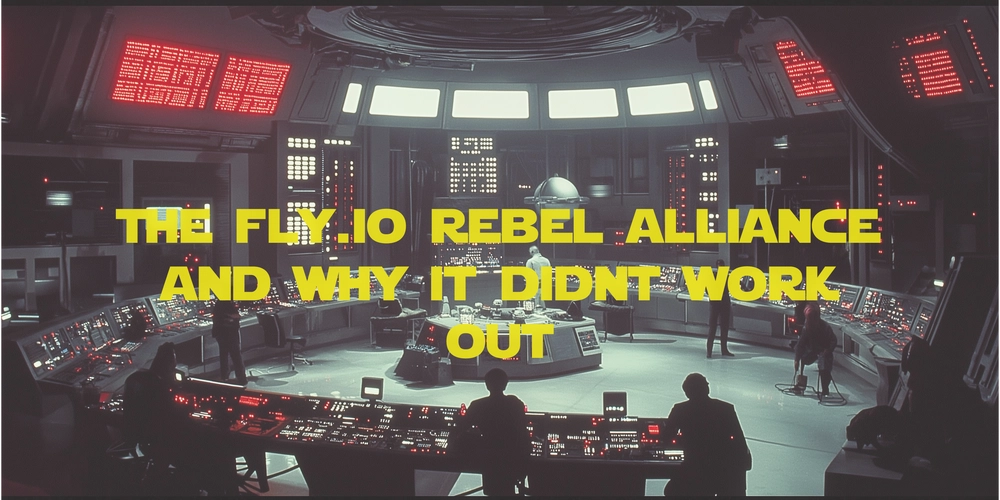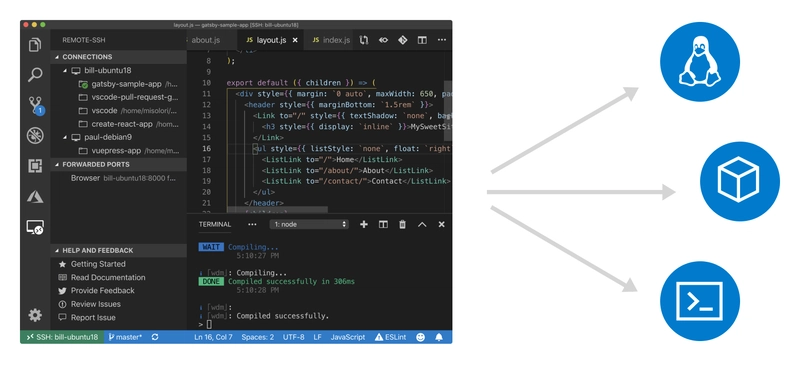The fly.io "Rebel Alliance" and Why It Didn't Work Out
I just listened to this really interesting podcast with Kurt Mackey, the CEO of fly.io, where he talked about this idea he called the "Rebel Alliance" for cloud computing. Basically, the thought was, what if instead of one giant company trying to do everything, we had a bunch of smaller startups, each focusing on what they do best? Like, one's the master of compute, another does databases, and they all work together like a well-oiled machine. This would stand in contrast to the current Hyperscalers (AWS, GCP, Azure) who try to do everything (often with a meh experience). Why It Didn't Pan Out Different Customer Needs Each company had its own crowd to please. If you're into databases, you're probably looking at what big companies need, but if you're all about compute, maybe you're more focused on the solo developer. Getting these different focuses to play nice together was tough. Control Freaks Nobody wanted to build their service on top of someone else's stuff. Everyone wanted to be the master of their own domain, leading to a lot of "not invented here" syndrome. Ego Kurt mentioned that companies, especially in the startup world, are all about building their empire. Sharing the pie with others? Not so much. That competitive streak made collaboration less appealing. The Integration Struggle Kurt pointed out the obvious fact that developers aren't just looking for a collection of awesome services. They want everything to work together without having to jump through hoops. Without that smooth integration, even the best services can feel like a headache. If you ever tried to create a partnership with another company you will know how hard it is to create a smooth experience! What We Can Take Away User Experience First It's not just about having great tools; it's about how they fit together. Integration matters a lot. Control vs. Teamwork Sometimes, letting go a bit and working with others can lead to something special. It's about finding that sweet spot. This is also something that applies to daily work! Know Your Audience You've got to build for your users, not just for the sake of building. Understanding who you're serving is crucial. Picking collaboration partners with completely different audiences can lead to some real issues later on. (Imagine the database pricing starts at $1000/month while compute starts at $4!) As someone also building in the cloud/infra space, I really liked this podcast and learned a lot. This also isn't special only for Fly, others like Vercel are trying the same concept. Do you think this will work out in the long-term, or is it a winner-takes-all situation where the winner will provide all services? Let me know what you think!

I just listened to this really interesting podcast with Kurt Mackey, the CEO of fly.io, where he talked about this idea he called the "Rebel Alliance" for cloud computing. Basically, the thought was, what if instead of one giant company trying to do everything, we had a bunch of smaller startups, each focusing on what they do best? Like, one's the master of compute, another does databases, and they all work together like a well-oiled machine. This would stand in contrast to the current Hyperscalers (AWS, GCP, Azure) who try to do everything (often with a meh experience).
Why It Didn't Pan Out
Different Customer Needs
Each company had its own crowd to please. If you're into databases, you're probably looking at what big companies need, but if you're all about compute, maybe you're more focused on the solo developer. Getting these different focuses to play nice together was tough.
Control Freaks
Nobody wanted to build their service on top of someone else's stuff. Everyone wanted to be the master of their own domain, leading to a lot of "not invented here" syndrome.
Ego
Kurt mentioned that companies, especially in the startup world, are all about building their empire. Sharing the pie with others? Not so much. That competitive streak made collaboration less appealing.
The Integration Struggle
Kurt pointed out the obvious fact that developers aren't just looking for a collection of awesome services. They want everything to work together without having to jump through hoops. Without that smooth integration, even the best services can feel like a headache. If you ever tried to create a partnership with another company you will know how hard it is to create a smooth experience!
What We Can Take Away
User Experience First
It's not just about having great tools; it's about how they fit together. Integration matters a lot.
Control vs. Teamwork
Sometimes, letting go a bit and working with others can lead to something special. It's about finding that sweet spot. This is also something that applies to daily work!
Know Your Audience
You've got to build for your users, not just for the sake of building. Understanding who you're serving is crucial. Picking collaboration partners with completely different audiences can lead to some real issues later on. (Imagine the database pricing starts at $1000/month while compute starts at $4!)
As someone also building in the cloud/infra space, I really liked this podcast and learned a lot. This also isn't special only for Fly, others like Vercel are trying the same concept. Do you think this will work out in the long-term, or is it a winner-takes-all situation where the winner will provide all services? Let me know what you think!
What's Your Reaction?




























